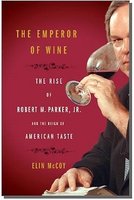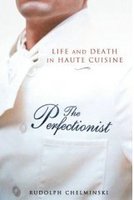Two recent books about megalomaniacs: genial, larger-than-life luminaries of the food and wine world, Robert Parker, the American wine critic, and Bernard Loiseau, the French chef. They both tell of youthful talent that became increasingly ambitious as it ripened. Parker, the most powerful individual in the wine industry, ultimately claimed virtual infallibility; Loiseau, anointed with three Michelin stars but beset with doubts, ultimately committed suicide.
Exceptional books written by sympathetic journalists with inside knowledge. A unique perspective on the private lives of two men with very public working lives.
The Emperor of Wine:the Rise of Robert M. Parker Jr. and the Reign of American Taste by Elin McCoy
The Perfectionist: Life and Death in Haute Cuisine by Rudolph Chelminksi
The Emperor of Wine, by Elin McCoy (herself a respected wine writer), describes Parker's steady ascendancy to the pulpit of supreme enological arbiter thanks to his gifted palate and demonic resolve. But those two qualities alone wouldn't have made him Emperor; it took Parker's easy-to-understand 100-point ratings and America's "discovery" that wine wasn't just for effete snobs.
McCoy's conclusion comes down hard on Parker: the tyranny of a single palate, a scoring system that's "a joke in scientific terms" and a misleading indicator of quality or pleasure. Parker, says McCoy, turns wine into a contest rather than an experience. Worse, he brooks no challenge to his authority, to his moral and gustatory infallability.
Cornichon is no particular fan of Parker's, either. Time and again, growers in France have admitted or complained that Parker's popularity is forcing them to make a certain style of wine. Which is why I that wish McCoy--who had full access to Parker over a period of several months--had given us a sense of how a Parker tasting note comes about: Parker in the vineyard or the cellar with the winemaker, Parker in his tasting lab with a sample bottle, at his computer writing out his notes, so we'd what went into the actual publication and could compare Parker's words with McCoy's observations.
One final thing I miss: a clear explanation of how (relatively) small the American market is, even for the very top French estates. I wish McCoy's book explained that the USA accounts for only one-sixth of all French wine exports (Belgium and Denmark buy more French wine than we do). So why did so many French winemakers quickly become such pushovers for an American critic?
The Perfectionist is the saga of Bernard Loiseau, big, outwardly gregarious and confident, inwardly shy and insecure, whose traveling salesman father apprentices him, as a teenager, to the chef at his favorite restaurant. As it happens, while young Bernard is flailing away at his first kitchen tasks, the Michelin guide awards the restaurant three stars. Bernard, who's a competent though not exceptional cook, is awestruck: winning those three stars for himself become his life's obsession.
Bernard is fortunate to find a patron who sets him up at a country inn, the famous Côte d'Or in Saulieu, a once-thriving market town in northern Burgundy now bypassed by the autoroute. No matter: Bernard settles in for the long haul. He assembles a talented team for his kitchen and dining room, he courts the Parisian press, he develops a network of local suppliers. He's unlucky in love (his first wife cheats on him with the maitre d'hôtel) but has a knack for the restaurant business (food journalists adore him); he wins back one Michelin star for venerable auberge, then two.
Now, as Bernard puts it, the trouble with success in the restaurant world is, "C'est jamais gagné." The battle's never over. First you strive for ten or twenty years to reach the top. It's not like training for the Olympics, where a single perfect routine wins you the gold medal; you've got to score a ten every day, twice a day. But then, after you've won, you panic even more: now that you've been given those stars, what if they take them away?
And poor Bernard, though happily married to his second wife, was bipolar. Mostly manic: that was the perfectionist his staff knew, the outgoing giant adored by the media and the public.
(He was ebulliant, too, when I met him in Saulieu in the fall of 1998, eager to discuss his plans for a new bistro in Paris--eventually three--and an unprecendented plan to raise money by being listed on the Paris stock exchange.)
Then third Michelin star did come along, and it seemed Bernard could do no wrong. But the tentacles of darkness were stronger than anyone knew.
A slight slip in one of the guidebooks, a rumor that his third Michelin star was in jeopardy, a change in the culinary fashion dictated by Paris critics: it all took its toll on Bernard.
His manic-depressive disorder--easy to diagnose in retrospect--was never treated. The right medications, it's assumed, could have saved him from his private demons. Instead he succumbed.
Rudolph Chelminski, a keenly observant foreign correspondent, had already written one of the liveliest books about gastronomy, The French At Table, some 20 years ago. This longevity--critical to professional acceptance in France--and his deep understanding of French culinary history gave him unprecedented access to all the actors in this drama, including Bernard himself over a period of many years.
You taste Bernard's recipes, savor his enthusiasm for hospitality on every page. Even as you cringe at his effusiveness, you savor his generosity.
In the end, you mourn his death, but when the latest Michelin guide again awards his restaurant three stars, you recognize that Bernard Loiseau's spirit lives on.

